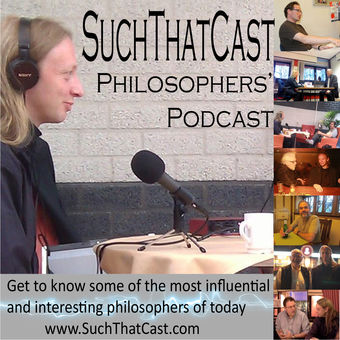
SuchThatCast - Behind the Philosophy
Johnny Hartz Søraker
SuchThatCast is dedicated to getting to know some of the most influential philosophers (broadly speaking) of today. It seeks to provide an alternative to most other philosophy podcasts (many of which are excellent), by taking the form of a face-to-face conversation (I will never do a phone/skype interview) where the guest is free (and encouraged) to share information about themselves that may not be appropriate in other forums: this includes stories about their unique and often unconventional career paths, seminal events and figures in their lives, undeveloped ideas and generally whatever they are passionate about.
- 1 hour 12 minutesEpisode 12: John Cottingham
John Cottingham is Professor Emeritus of Philosophy at the University of Reading and an Honorary Fellow of St John's College, Oxford. His main research areas include philosophy of religion, moral philosophy, and early-modern philosophy. He is perhaps best known for his translation and commentary of René Descartes - in particular as co-editor and translator of the three-volume standard Cambridge edition of The Philosophical Writings of Descartes.
In our conversation, we talk about his early training in Latin and Greek, his experiences with all aspects of student life at Oxford in the 60s and the seminal figures during those days (in particular Anthony Kenny and Bernard Williams), the differences between philosophy then and now, and his increasing emphasis on the importance of spirituality.
Hosted on Acast. See acast.com/privacy for more information.
31 August 2015, 8:15 am - 1 hour 11 minutesEpisode 11: Live from IACAP’14, featuring Bringsjord, Chaitin, Taddeo & SiegThis episode is recorded live in front of an audience at theInternational Association for Computing and Philosophy (IACAP)2014 conference in Thessaloniki, Greece. The guests are four of the most interesting participants at that conference: Selmer Bringsjord, Gregory Chaitin, Mariarosaria Taddeo and Wilfried Sieg. They represent both diversity, all of them having quite different backgrounds and main research area, but they all have a common denominator in logic and formal methods. This forms the backdrop for many of our discussions, in addition to background stories, more or less strange side-projects as well as future hopes and desires. The whole thing was an experiment, but it worked out quite well. I can only hope that the recording can do some justice to the event.
Hosted on Acast. See acast.com/privacy for more information.
17 November 2014, 5:23 pm - 57 minutes 10 secondsEpisode 10: Kristin Shrader-Frechette
Kristin Shrader-Frechette is O'Neill Family Professor at the Department of Biological Sciences and Department of Philosophy at the University of Notre Dame. She has previously held senior professorships at the University of California and the University of Florida. Author of 16 books and nearly 400 articles, Shrader-Frechette’s theoretical work appears in journals such as Biological Theory, Bioscience, Health Physics, Oikos, Philosophy of Science, Quarterly Review of Biology, Synthese, and Trends in Ecology and Evolution. Most of her work is concerned with the ethical problems in risk assessment, public health, and environmental justice - especially related to radiological, ecological, and energy-related risks. She has received the World Technology Award, the Global Citizenship Award, and the Catholic Digest named her one of 12 "Heroes for the US and the World". She has served as an advisor to numerous governments and international organizations, including the United Nations and the World Health Organization.
In this conversation, Shrader-Frechette talks about a childhood filled with activism, her fight to give a voice to the poor in the face of company greed (and the personal repercussions), and her use of service teaching to engage students. The red line throughout the episode is her genuine passion for creating a healthier and more just society, showing that philosophers can extend their voice beyond academia and contribute to real change in the world.
Hosted on Acast. See acast.com/privacy for more information.
3 June 2014, 9:16 am - 58 minutes 35 secondsEpisode 9: John Dupré
John Dupré is the director of the ESRC Centre for Genomics in Society and professor of philosophy at the University of Exeter. Dupré was educated at the University of Oxford and the University of Cambridge and taught at Oxford, Stanford University and Birkbeck College of the University of London before moving to Exeter. Dupré’s chief work area lies in philosophy of biology, philosophy of the social sciences, and general philosophy of science. Together with Nancy Cartwright, Ian Hacking, Patrick Suppes and others, he is often regarded as belonging to the “Stanford School” of philosophy of science. In 2010 Dupré was elected a Fellow of the American Association for the Advancement of Science in recognition of his work on Darwinism, and became President-Elect of the British Society for the Philosophy of Science.
Dupré’s seminal “The Disorder of Things” made a huge impact on me as a philosophy undergrad, and we spend quite some time discussing the background for the book as well as its advancement of a pluralistic model of science as opposed to the common notion of reductionism. We also discuss his complex path through academia, and his work on feminism, evolutionary psychology and other issues centred around the issue of essentialism and the disunity of science.
Hosted on Acast. See acast.com/privacy for more information.
23 May 2013, 10:29 am - 51 minutes 41 secondsEpisode 8: John Sutton
John Sutton is Professor of Cognitive Science at Macquarie University in Sydney, Australia. He is currently head of the same department, having previously also been head of the Macquarie Philosophy department. He is author of Philosophy and Memory Traces:Descartes to Connectionism (Cambridge University Press, 1998), and co-editor of Descartes' Natural Philosophy and the Sage journal and Palgrave Macmillan book series Memory Studies.
Sutton and I discuss a range of topics, including the occult in literature, Descartes, shared memories, the extended mind hypothesis, identity, skills in sports, and what the role of a philosopher should be in an interdisciplinary setting.
Hosted on Acast. See acast.com/privacy for more information.
2 April 2013, 3:56 pm - 1 hour 5 minutesEpisode 7: David Koepsell
David Koepsell earned his PhD in philosophy as well as his law degree from the University at Buffalo, where he studied with Barry Smith. He has authored numerous articles as well as authored and edited several books, including Searle on the Institutions of Social Reality, The Ontology of Cyberspace: Law, Philosophy, and the Future of Intellectual Property. He has lectured worldwide on issues ranging from civil rights, philosophy, science, ontology, intellectual property theory, society, and religion. Koepsell has practiced law, worked for Bowstreet, Inc. as an ontologist in Portsmouth, New Hampshire, and taught at the University at Buffalo. He was appointed Assistant Professor of Philosophy at TU Delft in September 2008.
Koepsell and I spend quite some time discussing his controversial views on patenting and copyright, which naturally leads us into the foundations of ethics and law. Despite Koepsell's largely analytic style, we also touch upon phenomenology and the value of continental philosophy. Since Koepsell was executive director of the Council for Secular Humanism, we also dicuss the culture wars in the US before concluding with the relation between popular culture and philosophy.
Hosted on Acast. See acast.com/privacy for more information.
13 February 2013, 2:13 pm - 1 hour 7 minutesEpisode 6: Michael Boylan
Michael Boylan is the John J. McDonnell jr chair in Ethics, and professor and chair of the philosophy department at Marymount University in Arlington, Virginia. In addition to being a poet and novelist, he has written more than 100 published articles and 25 books primarily in ethics, social and political philosophy, philosophy of science, and the intersection of philosophy and literature. He was a fellow at the Center for American Progress, a Washington DC policy think tank from 2007-2009 and is the general editor of a series of trade books on public philosophy with Basil Blackwell Publishers and another series of books with Prentice Hall as well as being the ethics editor for the Internet Encyclopedia of Philosophy.
Boylan was actually the first guest that I had never met before, so I had no idea how the interview would go – nor what kind of person Boylan was. There was no need for worry, though, as Boylan turned out to be engaged, enthusiastic and inspiring – on top of being a very nice guy. We had a great conversation, mostly centred around the relationship between philosophy and literature, (ancient) philosophy of biology, the good life and several other topics covered in Boylan’s impressive oeuvre.
Hosted on Acast. See acast.com/privacy for more information.
6 December 2012, 3:06 pm - 1 hour 10 minutesEpisode 5: Peter AsaroPeter Asaro is Assistant Professor at the School of Media Studies in the New School for Public Engagement, New York. His work examines the interfaces between social relations, human minds and bodies, artificial intelligence and robotics, and digital media. His current research focuses on the social, cultural, political, legal and ethical dimensions of military robotics and UAV drones, from a perspective that combines media theory with science and technology studies. Although dealing with topics similar to previous guests Noel Sharkey and Wendell Wallach, Asaro comes at it from a very different perspective – combining a range of different academic disciplines and with an eye to the interaction between technology and complex social networks. He has also been very creative in using alternative outlets for his research, including the movie Love Machine, featuring Daniel Dennett, Rodney Brooks, Hubert Dreyfus and a host of other leading philosophers. We spend most of the episode talking about the dramatic and subtle effects of robotics, when it comes the love, war and labour. Asaro also sheds light on much early work in cybernetics, as well as the notion of participatory design
Hosted on Acast. See acast.com/privacy for more information.
25 October 2012, 2:24 pm - 1 hour 11 minutesEpisode 4: Noel Sharkey
Noel Sharkey is Professor of A.I. and Robotics, and Professor of Public Engagement at the University of Sheffield, but some of you may know him as the expert on the BBC series Robot Wars and Techno Games. We spend most of the episode talking about the dangers of autonomous robots in the battlefield, but we also get a glimpse into Noel’s multifaceted and unconventional background. The conviction, honesty and sense of urgency Noel brings to the table is important and contagious, so I hope it’ll prove inspiring to many of you as well.
Hosted on Acast. See acast.com/privacy for more information.
1 October 2012, 12:00 pm - 1 hour 2 minutesEpisode 3: J.D. TroutSuchThatCast goes mobile in the third episode, as I interview J.D. Trout on the appr. 2 hour train ride between Enschede and Schiphol airport. Trout is Professor of Philosophy and Psychology at Loyola University Chicago. I was a little concerned whether an interview on the train would work out, but although editing was a pain with all the background noise and announcement interruptions, the episode turned out to contain everything I want out of this podcast: a fascinating and inspiring background story, deeply interesting and more or less unpublished philosophical ideas, a flowing conversation, and the occasional chuckle – all in the voice of an opera singer. Trout talks about a past filled with challenging circumstances and hard work as far removed from philosophy as possible, the importance of psychological research for policy making, the remarkably interesting field of speech recognition, the contingency of scientific progress as exemplified by corpuscularism and alchemy, and a host of other interesting topics. I hope you’ll like this conversation as much as I did.
Hosted on Acast. See acast.com/privacy for more information.
16 September 2012, 10:00 pm - 1 hour 9 minutesEpisode 2: Wendell WallachIn this second episode, I talk to Wendell Wallach, who is a consultant, ethicist, and scholar at Yale University’s Interdisciplinary Center for Bioethics. Among many other things, Wendell co-authored (with Colin Allen) the influential Moral Machines: Teaching Robots Right From Wrong (Oxford University Press 2009), which maps the new field of machine ethics. Wallach talks about his extraordinary career, from being a spiritual guru in the 1960s to becoming one of today’s leading authorities on machine ethics. He also discusses his involvement in the transhumanist society, as well as his current project of developing a ‘silent ethics’, grounded in meditation practices.
Hosted on Acast. See acast.com/privacy for more information.
3 September 2012, 7:57 am - More Episodes? Get the App
- http://suchthatcast.com
- English
Your feedback is valuable to us. Should you encounter any bugs, glitches, lack of functionality or other problems, please email us on [email protected] or join Moon.FM Telegram Group where you can talk directly to the dev team who are happy to answer any queries.
 WHY? - Philosophical Discussions About Everyday Life
WHY? - Philosophical Discussions About Everyday Life
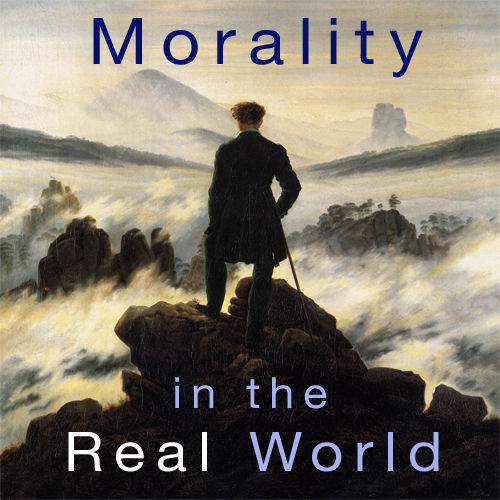 Morality in the Real World
Morality in the Real World
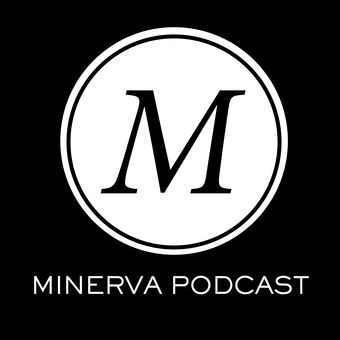 Minerva
Minerva
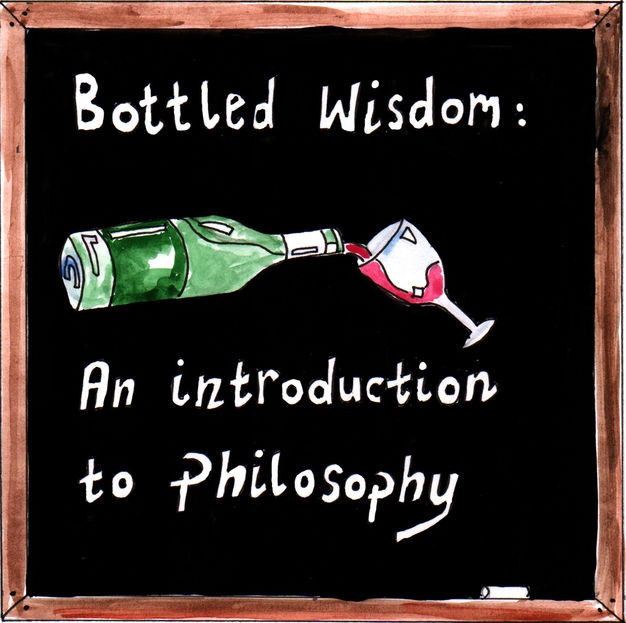 The Thirst Podcast's Bottled Wisdom
The Thirst Podcast's Bottled Wisdom
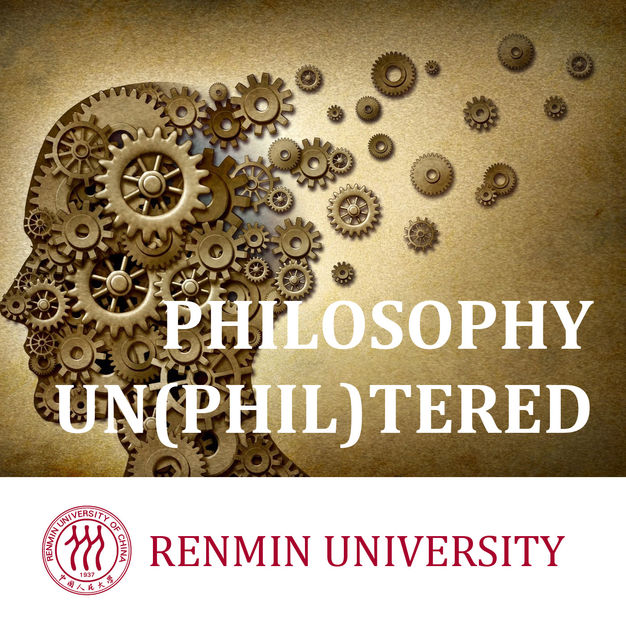 Philosophy Un(phil)tered
Philosophy Un(phil)tered